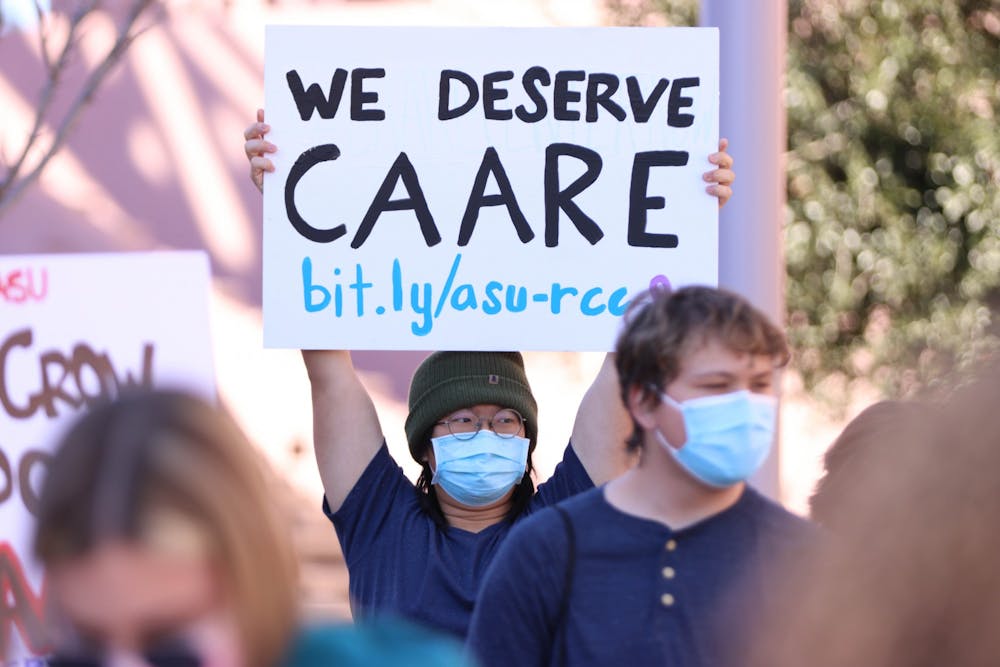Content warning: This article contains mentions of sexual assault and other sensitive issues. For additional resources, contact the national sexual assault hotline at 800-656-4673 or visit the Rape, Abuse & Incest National Network’s website.
Since the overturning of Roe V. Wade in June, the weight of continuous attacks on sexual freedom and reproductive rights has been especially heavy for women and sexual assault survivors. Arizona residents are left particularly vulnerable, with lack of clarity on state abortion policies and mass shutdowns of Planned Parenthood clinics.
Now, more than ever, ASU must establish the Campus Assault Advocacy Resources & Education Center.
Sun Devils Against Sexual Assault has worked tirelessly for years to raise awareness for the severity of on-campus sexual assault and expose the failings of ASU’s resources for survivors. After countless personal stories, meetings with administration, student protests and a formal proposal for the CAARE Center, ASU still does not have a sexual assault crisis center.
READ MORE: Student groups protest for better sexual assault services from ASU
According to Live Well at ASU, 42.2% of ASU students report having a sexual partner within the last 12 months, meaning there is no denying that many students are sexually active. Of these students, many express concern for establishing a centralized sexual resource center on campus.
“The fight for a CAARE Center this late in ASU’s ‘legacy’ grossly showcases how badly we need (the center), but it also shows that ASU administration is putting survivors on the back burner," Hannah Hunicke, a graduate student majoring in higher and postsecondary education, said.
ASU's lack of support is felt campus-wide, displayed by the dozens of student groups who have endorsed the CAARE Center proposal.
While rape culture exists everywhere, sexual misconduct is known to be prevalent in greek life communities, which have a strong presence at ASU. The party culture within greek life society leaves many members vulnerable to assault and in need of resources.
Senior environmental chemistry major and ASU Chi Omega member Kiahra Jones advocates for a resource center that allows students to know their options for birth control, sexually transmitted disease testing and support for survivors. These issues are of immediate concern for women involved in sororities and fraternities.
“(Fraternal communities) do not always have the health and safety of the women in their community as a priority, and they’re not always reliable advocates for women who find themselves in hard situations," Jones said. “A women’s care center could be a really good thing."
Jones also points out that if such a center is created, precautions should be taken to ensure that it is a safe place for its community. Many crisis centers are targeted by radical groups who are committed to steering people away and making them uncomfortable or shameful. ASU should keep this in mind if they commit to establishing such a center.
ASU administration’s response to these concerns has been apathetic, as they claim that ASU already has the resources students may need. ASU only has two victim advocates and three prevention staff, abysmal numbers for a University of over 77,300 students on-campus in the Phoenix metro area.
Multiple assault survivors have come forward with stories of complacency, interrogation and harassment when seeking help from ASU’s crisis services. Instead of being met with compassionate medical care and emotional support, survivors are often met with unaccommodating law enforcement without other support. ASU Health Services fails to provide survivors medical forensic exams.
A study by the Rape, Abuse and Incest National Network found that only 20% of college-aged women who experience sexual assault report it. Fear of retaliation and inefficiency in police reporting are among the many reasons women choose to stay silent. ASU is perpetuating this cycle of non-reporting by refusing to comply with the demands of their student population to create a crisis center.
On Sept. 19, a student forum with ASU President Michael Crow is being held in person and over Zoom. SDASA is encouraging the community to share their concerns and ask President Crow, "Why won't ASU hire more sexual violence prevention staff and confidential victim advocates?"
ASU’s complacency with sexual abuse in their student community is disappointing and irresponsible. Bringing concerns to the attention of administration is crucial. A CAARE Center is vital to ensure the safety of students, who are even more vulnerable amidst the severe attacks on women’s bodily autonomy.
Edited by Sadie Bugle, Logan Stanley and Kristen Apolline Castillo.
Reach the columnist at haleighbell1026@gmail.com and follow @wwoodengirl on Twitter.
Editor's note: The opinions presented in this column are the author's and do not imply any endorsement from The State Press or its editors.
Want to join the conversation? Send an email to opiniondesk.statepress@gmail.com. Keep letters under 500 words and be sure to include your university affiliation. Anonymity will not be granted.
Like The State Press on Facebook and follow @statepress on Twitter.




